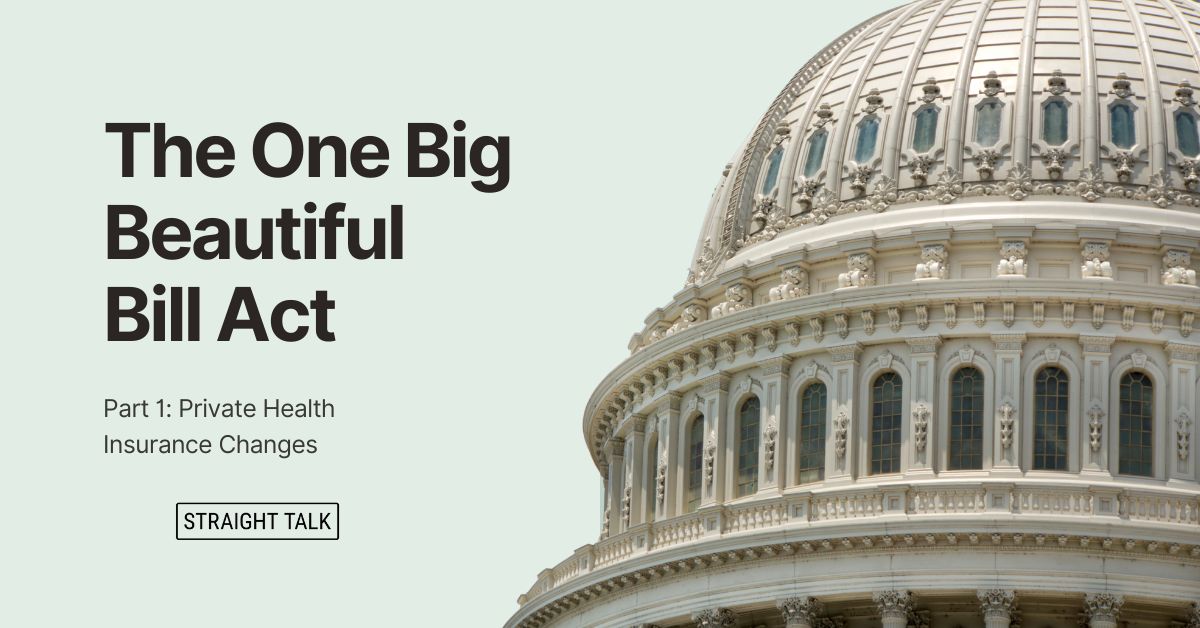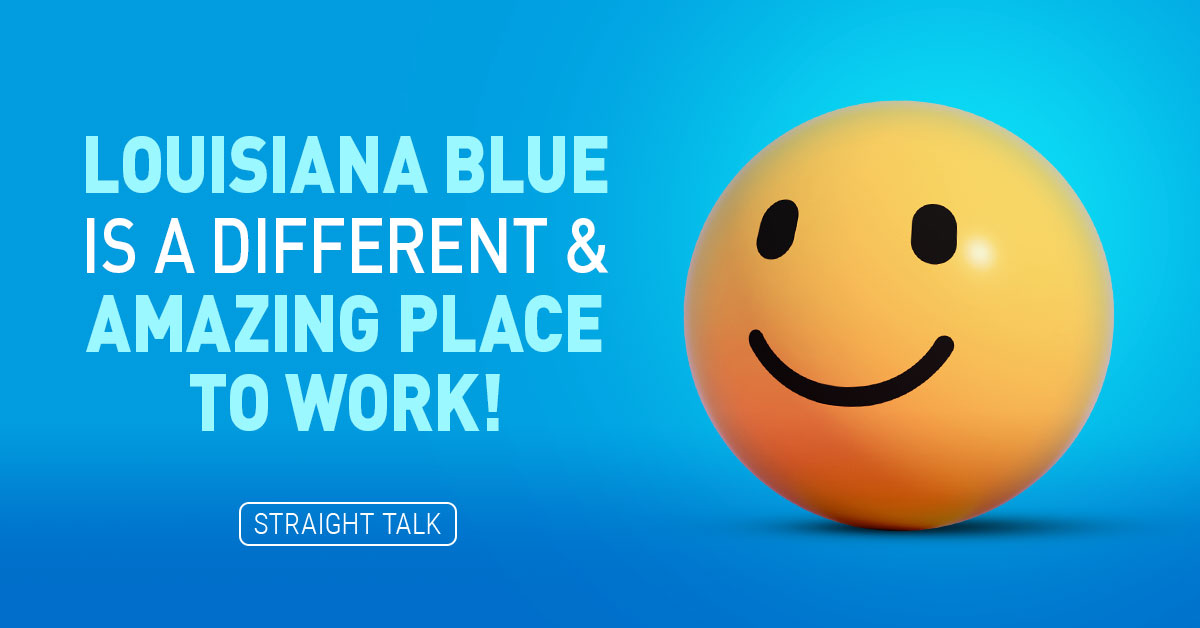One of my favorite sayings that my older relatives would bat around every time we went hunting, fishing, or enjoyed a football game and meal at their houses on a fall Sunday was this:
“Mike, that’s just short-term smart and long-term stupid! Stay away from it!”
It took me a few years to understand what they meant. But now, I clearly see the wisdom of that statement. Some things that look good now can really cost you in the long run.
Time to apply that wise saying to one of the most important providers of health insurance in the state of Louisiana!
One of the side effects of Louisiana being a poor state, having nearly the lowest household income level in the United States, is that most companies doing business here are small, with fewer than 50 employees.
Here at Louisiana Blue, we consider it a huge part of our mission and stewardship in our home state to defend those companies and keep insurance affordable for them. After all, we’d all like our children to find jobs and keep living here, and small companies are the backbone of our state’s employer base.
Back When Small Meant Small
Historically, small Louisiana companies that wanted to offer health insurance to their employees had to navigate state insurance regulations that were frankly not all that onerous. For decades, our state insurance department and Legislature described Louisiana’s small group market as companies with 2 to 35 employees. And the Louisiana Department of Insurance did an excellent job of ensuring the small group market was protected and the rates were reasonable.
In 2010, all of that changed with the passage of the Affordable Care Act (ACA). Rather randomly, starting in 2013, the definition of a “small group” was changed to companies with 2 to 50 employees. The regulatory process created under the ACA shifted regulating power over that marketplace to Washington D.C. At the same time, a national marketplace for individual health insurance was created (that’s HealthCare.gov), complete with tons of federal financial aid to subsidize the individual market. This left the small group market out in the cold, with no forward assistance.
It’s important to note that while small companies offering health insurance can treat their contributions as a business expense, there are no federal tax credits given to either the company or the employees who purchase insurance through their jobs. The employee is allowed to pay his share of premiums with pre-tax dollars, but that’s about it.
Compare this to the HealthCare.gov individual market, where someone who does not have job-based insurance can qualify for a significant amount of advanced premium tax credit to help them buy a health plan at very low cost – even $0 in premium, in many cases.
The Decline of Louisiana’s Small Group Market
Fast-forward 10 years since the ACA took effect, and the small group market, as envisioned and regulated by the federal government’s Center for Consumer Information and Insurance Oversight, is in decline almost everywhere. This market is buried under more than 100,000 pages of new federal regulation and oversight. These regulations specify things like the breadth of coverage, the amount of cost-sharing through deductibles and co-payments that are foisted upon the employees, and the maximum out-of-pocket costs an insured person must meet. These new rules span from coast to coast and are applied relatively uniformly in every state.
Louisiana is no exception. In fact, over the past 10 years, we’ve seen membership in small group products in the now federally regulated market DECREASE by over 20% – even as our overall state population stayed about the same. These smaller risk pools mean higher costs all the way around for every Louisiana small business trying to offer coverage to its employees and their families. So where did all these people go to get covered? It turns out, many places.
Louisiana’s Medicaid program began heavily subsidizing coverage for children way back in the late 1990s through the Children’s Health Insurance Program (CHIP, or LaCHIP here). Today, roughly 800,000 children in the state are enrolled in Medicaid. Many of them previously would have been in small group plans and covered through their employed parents. Children are generally a good risk in group settings because they are younger and have fewer long-term conditions overall. Their presence in a group’s insurance risk pool keeps rates lower than they would be otherwise. So as they left the small group market for Medicaid, medical costs in small groups went up, driving rates higher.
In 2016, Louisiana accepted the Affordable Care Act’s offer to expand Medicaid to any Louisianians in a household with an income of 138% of the Federal Poverty Level. Because the state was already heavily subsidizing children’s coverage in Medicaid when this happened, most of those newly eligible for Medicaid were low-income adults. Today, about 600,000 Louisianians have enrolled in this new category of coverage. Many of those who qualified for Medicaid under expansion left employer-based small group coverage at young ages, when they were considered to be very good risk and helpful at controlling rates.
Recently, two things happened that have driven (and are still driving) many more people out of the traditional small group market. First, the federal government, via the IRS, changed its mind concerning a 2014 ruling and has allowed thousands of spouses and dependents to leave group coverage. They can now access tax credits in the individual market and buy HealthCare.gov plans. This has proven a boon to them, as Louisiana employers now rank near the bottom in how much they pay toward healthcare coverage for employees’ spouses and dependents. Last time I checked, Louisiana was 49th out of 50 states in this important measure.
And when those spouses and dependents went to the individual market, they were greeted by the highest federal tax credits (subsidies) in the history of the ACA, making individual insurance in Louisiana just about the cheapest it’s ever been. Today, even a single person making up to $150,000 a year is often eligible for federal assistance!
Louisiana’s individual market size is up about 50% over the past 3 years since these huge new tax credits appeared and many folks left small employer groups.
Can Anything Be Done?
Now we are seeing products that shift more risk to employers and employees being offered to lots of small businesses. The issue is that these products were designed for large companies with lots of people and big risk pools. Smaller employers were never meant to be their own insurance company and assume that level of risk.
This is facilitated by carriers that often are not the same ones offering the group’s health plan. They offer “re-insurance” on these products to help groups avoid the rules in the ACA. The problem is that these products have very light, almost non-existent regulation compared to qualified health insurance plans under the ACA. And that means fewer benefits and less protection against rate increases and out-of-pocket costs.
These products only work if the employer has a young, healthy workforce or enough people in the pool to spread the risk around. That means even more good risk is being skimmed off the small group risk pool that is the backbone of small employer coverage. It is driving up rates, and is now happening around the country, especially here in Louisiana.
It’s important to understand that this sort of coverage is a temporary arrangement that can only work for a company as long as their workforce remains young and healthy. As soon as anyone covered gets sick, or the workforce’s average age crosses a certain threshold, costs skyrocket in those plans. Then, those employers have to try and find their way back into the (now damaged and more expensive) regular small group market. Of course, as you might expect, skimming off the youngest and healthiest folks, even for a year or two, accelerates the destruction of the small group health insurance market in our state.
The authors of the ACA never envisioned such products would be legal, let alone actually allowed at the state level. A few states are already trying to limit the damage to their own markets by outlawing or heavily regulating these products but in Louisiana, so far, they are allowed to flourish, driving up rates across the board. Only legislative action or regulatory changes can keep the small group market affordable and available for Louisiana’s small businesses.
The Straight Talk is, the small group market that has been a cornerstone of health insurance in Louisiana for decades is under assault by myriad forces, some benevolent, some damaging. It is our obligation as your Louisiana Blue plan to defend small companies’ rights to a permanent, affordable health insurance solution, regardless of changes at the federal level. And we will continue to do so, even if it means a legislative solution. It’s our job, and it’s the right thing to do.





Very interesting and informative information as usual, Mike!